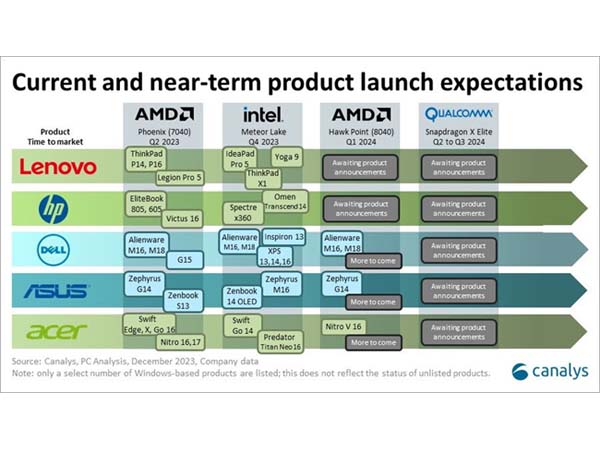
January 7, 2024: What impact will the introduction of AI-capable PCs have on the overall market in 2024 and beyond?
In a world where technology is rapidly evolving, the Canalys Now and Next in AI PCs report provides a comprehensive look into the dawn of AI in personal computing. This report explores how AI is transforming PCs, offering the perspective of Canalys' leading analysts on how AI is reshaping the technology landscape and offering opportunities for the future.
Central to the report's deep market analysis is Canalys' projection that 60% of PCs shipped by 2027 will be AI-capable, highlighting a significant shift in the technology landscape. This data underscores the rapid pace at which AI is being integrated into personal computers, reflecting both the advancing capabilities of hardware and the evolving demands of software applications. The report explores how this trend is fuelled by the emergence of specialized AI chipsets, which are becoming essential for enhancing both productivity and leisure experiences on PCs.
Executive Summary: The emergence of AI-capable PCs marks a watershed moment for the PC industry, as they are poised to reinvigorate the market and transform user experiences. Following the explosive growth of generative AI models, such as ChatGPT, on-device AI represents the next frontier. Integrating dedicated AI acceleration hardware into PCs can enable compelling innovation in efficiency, productivity, collaboration and creativity.
Conclusion
The emergence of AI-capable PCs brings immense opportunities alongside challenges. But with strategic execution focused on user needs, AI PCs can transform productivity, creativity, collaboration and more for both consumers and businesses. Industry leaders should closely track developments in this rapidly evolving space.
Our analysis indicates that AI-capable PCs are poised to achieve mainstream adoption in the coming years. To capitalize, technology vendors must prioritize ecosystem collaboration to develop differentiated solutions, communicate benefits clearly to customers, and uphold strong privacy and ethical standards in using data. This watershed moment has the potential to reinvigorate the PC market and usher in a new era of innovation through AI.
Key insights
1: Canalys defines AI-capable PCs based on hardware requirements today, but the definition will expand as capabilities advance
Canalys proposes a narrow initial hardware-focused definition of AI-capable PCs requiring dedicated chipsets/blocks to run AI workloads on-device. But as technical capabilities, use cases and customer requirements evolve, additional criteria will be needed to grade products on overall AI experience.
While almost all PCs can run cloud-based AI apps, those with on-device neural processing units (NPUs) are specially designed to capture the benefits of AI, such as real-time responsiveness, low latency, enhanced security and cost control. But as dedicated AI blocks become mainstream in processors, the current definition will be insufficient. Additional considerations around hardware benchmarks, pre-installed models and use case performance will be needed to properly distinguish AI capabilities. This highlights the need for an adaptable approach to defining and segmenting AI-capable PCs as the market matures.
2: By 2027, over 60% of PCs shipped will be AI-capable amid a major refresh cycle, with commercial adoption leading
Under Canalys’ current definition, almost one in five PCs shipped in 2024 will qualify as AI-capable, rapidly growing to over 60% by 2027, driven by refresh momentum and new on-device experiences. Businesses will adopt more aggressively than consumers, with over 60% of AI-capable PC shipments going to commercial buyers by 2027.
The upcoming end of support for Windows 10 will drive a major refresh cycle from 2024 to 2025, presenting an opportunity to migrate users to new AI-capable devices. Commercial deployment will spike as the benefits become apparent, leading to over 100 million shipments for the overall category in 2025. In the long term, over 60% of PCs shipped to businesses will be AI-capable by 2027, highlighting AI’s potential to transform workflows. While consumer adoption will be slower, it will catch up as creative use cases, such as content production and personalized recommendations, proliferate.
3: Major PC OEMs see AI PCs as a key innovation opportunity and are committing strongly with new models
Major Windows PC OEMs, including Dell, HP and Lenovo, are launching waves of new AI-accelerated models, starting in 2024, aligned with next-generation CPUs and the Windows 11 transition. Timely delivery of differentiated experiences is vital.
HP, Dell, Lenovo, Acer and Asus have all signalled plans to deliver new AI-capable PCs, timed alongside Intel and AMD’s new CPU product roadmaps. Bringing compelling offerings to market during the 2024/2025 Windows refresh presents an opportunity to accelerate upgrades. But success depends on ecosystem collaboration to communicate benefits clearly and deliver differentiated out-of-the-box experiences. Fostering an open, growth mindset focused on user needs will be vital.
4: Specialized processors from Intel, AMD, Apple and Qualcomm enable on-device AI performance
Leading chip vendors are incorporating dedicated AI acceleration blocks (NPUs) into CPUs to significantly improve on-device AI capabilities, aligning with trends in the PC industry’s evolution. Real-world performance will depend on ecosystem collaboration.
Processors integrating NPUs from Intel, AMD, Apple and Qualcomm will power the new wave of AI-capable PCs. But true differentiation will come from co-engineering hardware and software with OEMs and other partners. Efforts such as Intel’s partnership with over 100 ISVs show the importance of comprehensive collaboration to balance performance, energy efficiency and usability for meaningful user benefits.
5: Communicating benefits clearly and maintaining high ethical standards are imperative to drive adoption
To fully capture the opportunity, technology vendors must clearly communicate AI PC benefits to users and partners, adhere to high privacy and ethical standards in using data, and foster ecosystem collaboration to deliver impactful, differentiated experiences.
While partner sentiment on AI is improving, the value of AI-capable PCs is not yet clear to many businesses. Proof points showing quantified outcomes from deployments and use are needed. And as on-device AI requires access to user data, maintaining high privacy and ethics standards is essential to build trust. This includes transparency, accountability and user control. Responsible development and communication will accelerate adoption and lead to AI being integrated more ambiently across devices.